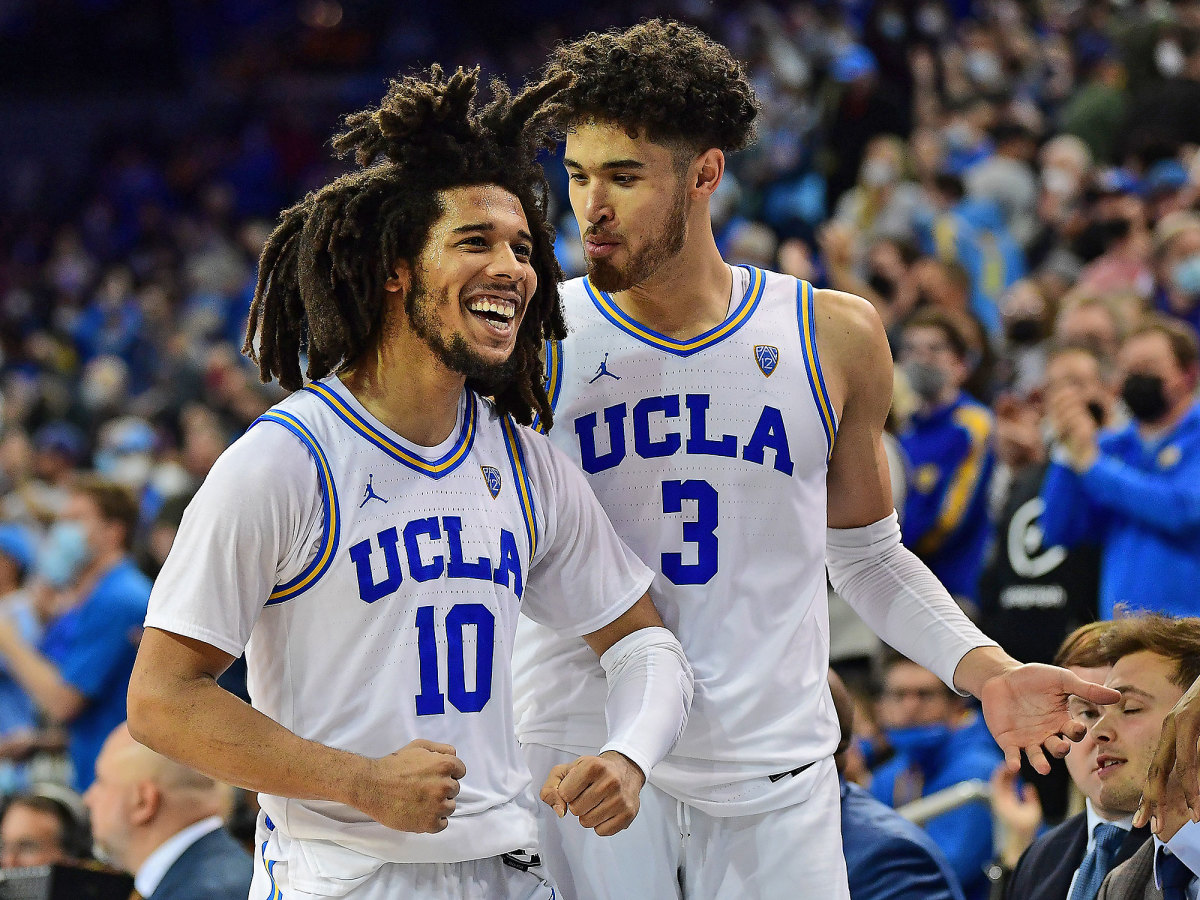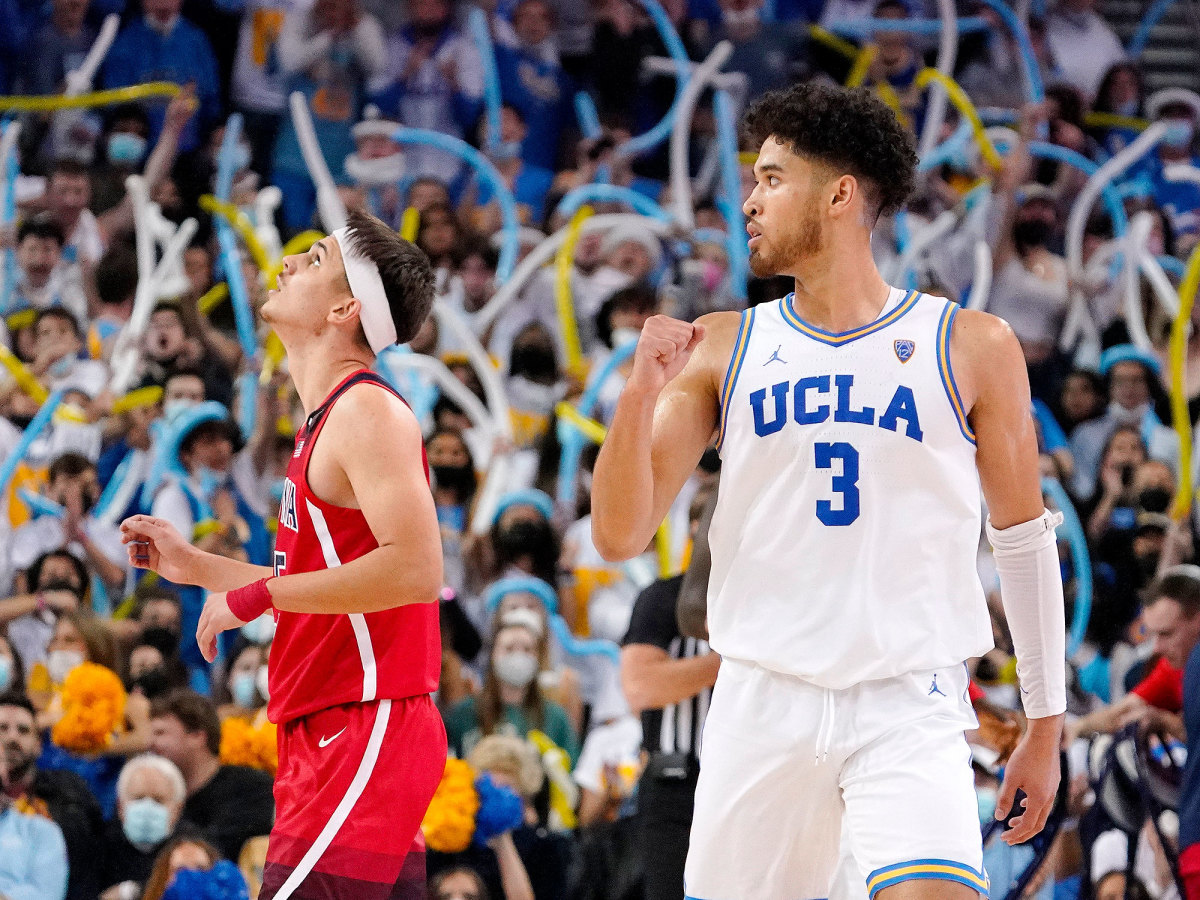‘We’re Going to Win Or Die Trying’: UCLA Is Embracing Its New Challenge
LOS ANGELES — A little more than three minutes into the second half of a top-10 showdown with Arizona on Tuesday night, UCLA’s Jaime Jaquez Jr. got a bit casual and lost the basketball near midcourt. He then was outhustled into the backcourt for the ball, resulting in a turnover.
Bruins coach Mick Cronin does not do casual. He immediately turned to his bench and waved Jules Bernard to the scorer’s table to replace Jaquez.
Truth be told, Jaquez really doesn’t do casual, either. This was an uncharacteristic play from a three-year starter whose effort level usually tilts toward the extreme. But with Cronin, usually playing hard is not acceptable when always playing hard is the standard.
“We’re going to win or die trying,” Cronin says. “UCLA is the greatest four letters in sports, and we want the players to use the brand. But there’s going to be no renting of the four letters. While here, we play to win, and there is no concession on that. That will be all that matters when you put the jersey on.”

After two-and-a-half minutes on the bench, Jaquez returned to the lineup as the personification of his coach’s win-or-die-trying credo. The 6'7" wing dominated the next 12 minutes—scoring eight straight UCLA points in one stretch, grabbing rebounds, blocking three shots, handing out two assists and making a steal. Jaquez wound up playing a team-high 34 minutes in a 75–59 takedown of the No. 3 team in the AP poll, doing all the things that make him a potential first-round NBA draft pick.
“Effort matters,” Cronin says.
The Bruins (14–2) are an anomaly in a transient sport—stable, old, coachable, committed. They are built around a core of Greater Los Angeles guys (Jaquez, Bernard, Cody Riley, David Singleton) and an Iowa point guard (Tyger Campbell) who have stayed in one place for years. They were recruited by the previous coach, Steve Alford, and could have scattered when he was fired. Cronin arrived from Cincinnati in 2019 with an unflinching intensity that his new players would have to match.
“They stayed, and they let me coach them,” he says.
The remaining group has been joined by a couple of transfers coming back home (Johnny Juzang from Kentucky and Myles Johnson from Rutgers), a sophomore from Riverside (Jaylen Clark) and a freshman from Long Beach (Peyton Watson). There are local high school teams that are less authentically Angeleno than the Bruins.
But these guys are no SoCal softies; their determined run to within a half-court shot of the national championship game last year showcased a ferocious, competitive drive. That team was one of just five NCAA tournament No. 11 seeds ever to make the men’s Final Four, and only an epic Jalen Suggs bomb at the buzzer kept it from becoming the first to play in the title game.
“When we were in the bubble [in Indianapolis], it got to the point where I thought we were going to win the national championship,” Cronin says. “Because these guys will not give up.”
That stirring run marked the end of an exceedingly rare phenomenon: UCLA as an underdog. It was fun while it lasted in 2021, but the program that has won more men’s national championships than any, the bluest of bluebloods, was back. And when Juzang turned down the NBA last summer to stay in school with the rest of the core group, the sky-high expectations of old returned as well.
Thus began a new challenge: staying engaged and excited every step of the march toward March. That included momentum-killing COVID-19 issues that led to the postponement or cancellation of five games and left Pauley Pavilion devoid of fans for weeks. Ultimately, there is an innate knowledge of the season endgame: If a team knows that it can go from the First Four to the Final Four, how much does seeding matter?
Cronin’s job is to flush complacency from the locker room while still aiming to hit maximum stride in the postseason. A lifelong horse racing enthusiast, he recently bought a thoroughbred and named it Bruin Magic. Cronin sees his basketball team the way a trainer sees a talented young colt he’s trying to guide toward peaking at the Kentucky Derby.
“I know they have another gear,” he says. “They just haven’t given it to me yet.”

The satisfaction that came from beating Arizona on Tuesday was twofold: It was a big win in Pac-12 play, tying the Bruins for the lead in the conference; and it came against a team with a higher ranking and a lot of attendant buzz. The Wildcats came into the game 16–1 and were either first or second nationally in several major analytics rankings. Under first-year coach Tommy Lloyd, they were playing fast and fun basketball, having beaten Michigan and Illinois away from home and were considered the biggest revelation in the nation after starting the season unranked.
That allowed the Bruins to dust off the old chips and return them to their shoulders. They could be the hunter again. “We like being the underdogs,” Jaquez says, and his smile is a hint that he knows that role is receding into the past.
The campus trappings provide the “No Underdog” context. From the 11 national championship banners in a modernized Pauley Pavilion to the photos of all 41 UCLA first-round draft picks on the walls of the Mo Ostin Basketball Center next door, this is no Butler or Loyola Chicago. They practice on Russell Westbrook Court, reinforcing the selling point of UCLA as a pathway to the pros.
The day after walloping Arizona by 16—the Bruins’ largest margin of victory against a top-five opponent since 1980—Cronin settles into a chair in the practice gym with a weary but satisfied look on his face. It’s a busy week, with the rescheduled Arizona game wedged in before visits from California on Thursday and Stanford on Saturday. For that reason, the gym is quiet all day—there will be some film study of the Golden Bears on Wednesday night but no on-court practice.
Cronin knows not to push too hard right now, especially after getting the effort he did against the Wildcats. He kept coming back to the same word to describe it. “That was by far the most spirited 40 minutes of the year,” he says, and he knew he would get it. This was a big game, and he has a roster full of gamers.
This is a rare college basketball coaching luxury: such familiarity with his players that he can count on them, and they know what to expect from him. Most of them are in Year 3 with Cronin, reliable performers who are especially motivated when the stakes rise.
The night before, Campbell helped dog Arizona’s flashy second-year point guard, Kerr Kriisa, into an 0-for-12 shooting nightmare. At the other end, Campbell coolly ran the show as usual, recording his fourth straight game against the Wildcats without a turnover. A career 26% three-point shooter heading into this season, Campbell has upped that to 44% this year. “He’s extremely underrated nationally,” Cronin says. “He’s the heart of our team.”
Watson flashed his five-star talent on several occasions, the lights starting to come on for a 19-year-old Cronin can afford to bring along gradually. The highlight was a ruthless spike of a shot by Arizona guard Justin Kier and a hard stare afterward, showing the kind of edge Cronin has always prized in his players. “He can impact the game,” Cronin says. “We’re trying to win games and get him minutes. I have to keep him in mind in terms of, what do I want my team to look like in March?”
Bernard, Riley and Singleton, the three who have been around longest, made their veteran presence felt against Arizona. Bernard tied Juzang for team-high scoring honors with 15, making 7-of-11 shots, and had a team-high seven rebounds. Riley, who was injured in the season opener and didn’t play again until January, outmaneuvered Arizona’s tall post players for inside baskets and stepped outside for jumpers, scoring a dozen. Singleton, a glue guy off the bench, made the biggest shot of the game—a corner three that pushed the lead into double digits for good with seven minutes left, after it had been cut to eight.
Jaquez had his 12-minute burst of dominance, but there was more to his night than that. He is never far from the action and never afraid of the moment. If one player embodies the toughness Cronin has championed, it’s him. “He’s just got ‘winner’ written all over him,” Cronin says.
And then there was Juzang, the star who is so comfortable fitting in, typecast as a standstill shooter at Kentucky but now so much more. He was the picture of mellow contentment after a night when he made just six of 18 shots.
Juzang was brilliant in the NCAA run, averaging 22.8 points and making a succession of shots that seemed to get progressively more difficult as the games became bigger, prompting speculation he would leave for the NBA. But without certainty that he’d be drafted in a range that would produce a guaranteed contract, he stayed in school.
The junior was the center of the Pauley party well after the game ended and most of the fans had cleared out. This was the first time the Bruins had played in front of a home crowd since early December after COVID-19 protocols shut down attendance, and they were happy to linger in the afterglow.
A few dozen family members and friends of the players remained, and Juzang circulated easily from signing autographs and taking pictures to wrapping an arm around his mother. (A kid wearing a UCLA No. 33 jersey that read “Abdul-Jabbar” on the back got one picture but a demerit for historical accuracy, since Lew Alcindor was the center’s name when he played for the Bruins.) The other players had changed into street clothes, but Juzang was still wearing his white No. 23 jersey, shorts and sneakers when security finally asked everyone to clear the arena.
“These big moments are something we all live for,” Juzang says.
More big moments await the Bruins, including a return date with Arizona next week in Tucson. Mick Cronin’s task is keeping a team with vast March experience locked in from now until then, then making a run at hanging yet another banner at the program that has the most of them. They’re rising toward that goal, ready to win or die trying.
More College Basketball Coverage:
• What Now For Louisville Post-Chris Mack?
• The Drive That Fuels Johnny Davis, Breakout Star
• SI's Latest Projected NCAA Tournament Field
